英语动词时态专项练习题复习过程
小升初英语时态专项复习及答案(教案)
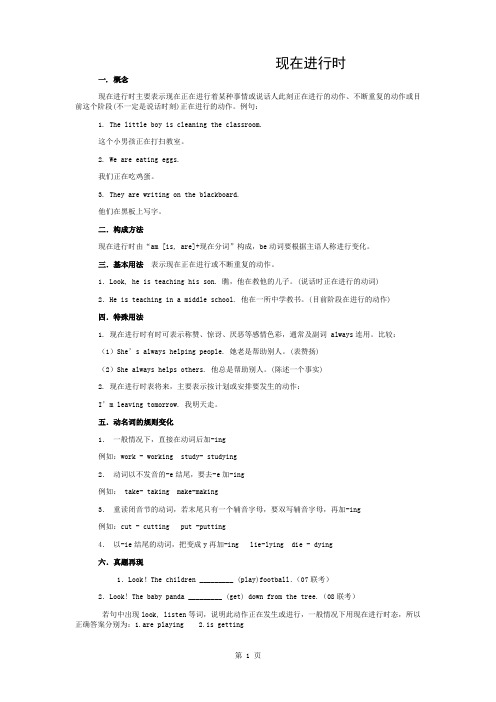
现在进行时一. 概念现在进行时主要表示现在正在进行着某种事情或说话人此刻正在进行的动作、不断重复的动作或目前这个阶段(不一定是说话时刻)正在进行的动作。
例句:1. The little boy is cleaning the classroom.这个小男孩正在打扫教室。
2. We are eating eggs.我们正在吃鸡蛋。
3. They are writing on the blackboard.他们在黑板上写字。
二.构成方法现在进行时由“am [is, are]+现在分词”构成,be动词要根据主语人称进行变化。
三.基本用法表示现在正在进行或不断重复的动作。
1.Look, he is teaching his son. 瞧,他在教他的儿子。
(说话时正在进行的动词)2.He is teaching in a middle school. 他在一所中学教书。
(目前阶段在进行的动作)四.特殊用法1. 现在进行时有时可表示称赞、惊讶、厌恶等感情色彩,通常及副词 always连用。
比较:(1)She’s always helping people. 她老是帮助别人。
(表赞扬)(2)She always helps others. 他总是帮助别人。
(陈述一个事实)2. 现在进行时表将来,主要表示按计划或安排要发生的动作:I’m leaving tomorrow. 我明天走。
五.动名词的规则变化1.一般情况下,直接在动词后加-ing例如:work - working study- studying2.动词以不发音的-e结尾,要去-e加-ing例如: take- taking make-making3.重读闭音节的动词,若末尾只有一个辅音字母,要双写辅音字母,再加-ing例如:cut - cutting put -putting4.以-ie结尾的动词,把变成y再加-ing lie-lying die - dying六.真题再现1.Look!The children _________ (play)football.(07联考)2.Look! The baby panda _________ (get) down from the tree.(08联考)若句中出现look, listen等词,说明此动作正在发生或进行,一般情况下用现在进行时态,所以正确答案分别为:1.are playing 2.is getting3.---Who are you _________, Andy ---Mum. (10联考)A. waitB. waitingC. waiting forD. wait for根据现在进行时的构成可排除A和 D选项,本题考查wait for+等候的对象这一用法,故选C.精点精练一、用动词的正确形式填空。
(英语)初中英语动词的时态解题技巧和训练方法及练习题(含答案)及解析

(英语)初中英语动词的时态解题技巧和训练方法及练习题(含答案)及解析一、初中英语动词的时态1.—Mum, I want to watch Everlasting Classics on CCTV 1 tonight.—Oh, dear, it for nearly twenty minutes. Come on!A.will begin B.will be on C.has begun D.has been on【答案】D【解析】【详解】句意:——妈妈,今晚我想在中央电视台1台看《永恒的经典》。
——哦,天哪,已经开演了将近二十分钟了。
加油!根据语境"for a few minutes(几分钟)和come on",可知节目已经进行了几分钟并且现在还在演,故应用动词的现在完成时态(基本结构:主语+have/has+动词的过去分词).故可排除A和B;又由于begin是非延续性动词不能和for a few minutes搭配,而has been on(表示持续性的状态)故选D。
2.—Hi, Nora. Is your mother at home?—Just a minute! She _______ flowers in the garden.A.plant B.is planting C.planted D.was planting【答案】B【解析】【详解】句意:——嗨,Nora。
你妈妈在家吗?——等一下!她正在花园里种花。
考查动词时态辨析题。
根据句意语境,可知用现在进行时,即“be+现在分词”结构。
she是单数第三人称,系词需用is。
故选B。
3.The girl is amazed at the beauty of Wuxi. She said she ____________ here for another two weeks.A.stayed B.has stayed C.would stay D.had stayed【答案】C【解析】句意:女孩对无锡的美景感到惊讶。
(英语)初中英语动词的时态技巧和方法完整版及练习题及解析

据后面的句子判断,对于坐在身边表示介意,故答案为
C。
13. —Will Sally come here tomorrow?
— I don ’ t know if she_______ here tomorrow. If she _______ here, I will tell you.
A. comes; comes
B. will come; comes C. comes; will come D. will come; will come
【答案】 B
【解析】
【详解】
句意: -Sally 明天会到这儿来吗? -我不知道她明天是否来这儿,如果她来的话,我会告诉
你的。 comes 来,动词的第三人称单数形式; will come 将会来,一般将来时态。根据句意
明年,用于一般将来时,可排除 C 项。根据句意结构和语境,可知选 B。
7.---Helen, When did you moved here? ---I______ here since two years ago.
A. moved 【答案】 D 【解析】
B. lived
C. have moved
D. have lived
【解析】句意:你介意我坐在你旁边吗,先生?
——对不起,我确实介意,我习惯了独自
坐着欣赏音乐。 mind doing sth.介意做某事, doing 前面可以用形容词性物主代词或代词的
宾格,首先排除 B,D; used to do 过去常常做某事, be used to doing sth.习惯于做某事,根
(英语)初中英语动词的时态技巧和方法完整版及练习题及解析
一、初中英语动词的时态
1.Alice, together with her classmates punished for breaking the school rules last week.
高中英语动词时态和语态专项练习题及答案
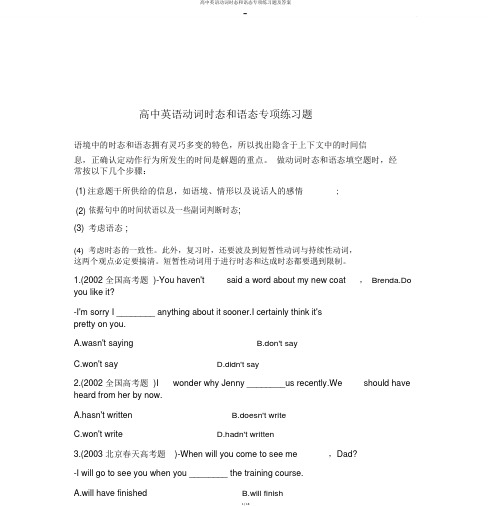
高中英语动词时态和语态专项练习题及答案-高中英语动词时态和语态专项练习题语境中的时态和语态拥有灵巧多变的特色,所以找出隐含于上下文中的时间信息,正确认定动作行为所发生的时间是解题的重点。
做动词时态和语态填空题时,经常按以下几个步骤:(1) 注意题干所供给的信息,如语境、情形以及说话人的感情;(2) 依据句中的时间状语以及一些副词判断时态;(3)考虑语态 ;(4)考虑时态的一致性。
此外,复习时,还要波及到短暂性动词与持续性动词,这两个观点必定要搞清。
短暂性动词用于进行时态和达成时态都要遇到限制。
1.(2002 全国高考题 )-You haven't said a word about my new coat,Brenda.Do you like it?-I'm sorry I ________ anything about it sooner.I certainly think it'spretty on you.A.wasn't sayingB.don't sayC.won't sayD.didn't say2.(2002 全国高考题 )I wonder why Jenny ________us recently.We should have heard from her by now.A.hasn't writtenB.doesn't writeC.won't writeD.hadn't written3.(2003 北京春天高考题)-When will you come to see me,Dad?-I will go to see you when you ________ the training course.A.will have finishedB.will finishC.are finishingD.finish4.(2003 北京春天高考题)-How long ________ at this job?-Since 1990.A.were you employedB.have you been employedC.had you been employedD.will you be employed5.(2003 上海春天高考题)By the end of last year,another new gymnasium________ in Beijing.A.would be completedB.was being completed----C.has been completedD.had been completed6.(2002 北京高考题 )The little girl ________her heart out because she________ her toy bear and believed she wasn't ever going to find it.A.had cried; lostB.cried; had lostC.has cried; has lostD.cries; has lost7.(2002 北京高考题 )-Excuse me ,sir.Would you do me a favor?-Of course.What is it?-I ________ if you could tell me how to fill out this form.A.had wonderedB.was wonderingC.would wonderD.did wonder8.(2002 上海高考题 )He will have learned English for eight years by thetime he ________ from the university next year.A.will graduateB.will have graduatedC.graduatesD.is to graduate9.(2002 上海高考题 )I feel it is your husband who ________for the spoiled child.A.is to blameB.is going to blameC.is to be blameD.should blame10.He has been writing the composition the whole morning and he still________.A.has beenB.doesC.hasD.is11.If city noises ________ from increasing , people ________ shout to beheard even at the dinner table 20 years from now.A.are not kept; will have toB.are not kept; have toC.do not keep; will have toD.do not keep; have to12.The price ________ ,but I doubt whether it will remain so.A.went downB.will go downC.has gone downD.was going down13.-How long ________ each other before they ________ married?-For about a year.----A.have they known; getB.did they know; getC.do they know; are going to getD.had they known; got14.You can't move in right now.The house ________.A.has paintedB.is paintedC.is being paintedD.is painting15.-Hey ,look where you are going!-Oh , I'm terribly sorry.________.A.I'm not noticingB.I wasn't noticingC.I haven't noticedD.I don't notice16.The reporter said that the UFO ________ east to west when he saw it.A.was travelingB.traveledC.had been travelingD.was to travel17.-Is this raincoat yours?-No, mine ________ there behind the door.A.is hangingB.has hangC.hangsD.hang18.I turned around and saw everybody ________ at a man who ________ loudly in a foreign language.A.was staring; was shoutingB.was staring; shoutingC.staring; shoutingD.stared; shouted19.Henry remained silent for a moment.He ________.A.thoughtB.had thoughtC.was thinkingD.was thought20.We would like to go and thank him ourselves ,but we ________ out hisaddress yet,A.haven't foundB.hadn't foundC.didn't findD.don't find21.Shirley ________ a book about China last year but I don't knowwhether she has finished.A.has writtenB.wrote----C.had writtenD.was writing22.-Have you got your test result?-Not yet.The papers ________.A.are not correctingB.have not correctedC.are still being correctedD.have already been corrected23.See the clouds! It ________ rain!A.willB.is going toC.mustD.certainly24.Do I have to take this medicine? It ________ so terrible.A.tastesB.is tastingC.is tastedD.has tasted25.Don't take the magazine away.It ________ me.A.is belonged toB.belongs toC.was belonged toD.is belonging to26.Is this the third time that you ________ late?A.have beenB.amC.wasD.had been27.-Do you know when Tom ________ from abroad?-Perhaps it will be a long time before he ________.A.will come; will comees; will comeC.will come; comeses; comes28.My uncle said that he would telephone but I ________ from him so far.A.didn't hearB.hadn't heardC.haven't heardD.won't hear29.The telephone ________ four times in the last hour ,and each time it________ for my roommate.A.has rung; wasB.has been ringing; isC.had rung; wasD.rang; has been30.A storm ________ by a calm.A.is often being followedB.was often followedC.is often followedD.has often been followed----31.The pen I ________ I ________ is on my desk,right under my nose.A.think; lostB.thought; had lostC.think; had lostD.thought; lost32.-We could have walked to the station.It was so near.-Yes ,a taxi ________ at all necessary.A.wasn'tB.hadn't beenC.couldn't beD.won't be33.A friend of mine returned to his house after a holiday only to findit ________.A.to be brokenB.had broken intoC.was brokenD.had been broken into34.They believed that by using computers the production of their factory ________.A.will greatly increaseB.would greatly increaseD.will have been greatly increased35.His eyes shone brightly when he finally received the magazines he________.A.had long been expectedB.had long expectedC.has long expectedD.was long expected36.-Do you like the new pen?-Yes ,it ________ very well.A.is writtenB.is writingC.writesD.wrote37.-Oh , it's you? I didn't recognize you.-I ________ my hair cut,and I ________ new glass.A.had; was wearingB.have had; am wearingC.had; woreD.have had; wear----38.As she ________ the newspaper , Granny ________ asleep.A.read; was fallingB.was reading; fellC.was reading; was fallingD.read; fell39.However hard you ________,you will never succeed in pleasing her.A.tryB.will tryC.should tryD.would try40.-Can I help you ,sir?-Yes ,I bought this radio yesterday , but it ________.A.didn't workB.won't workC.can't workD.doesn't work41.-How are you today?-Oh , I ________ as ill as I do now for a very long time.A.didn't feelB.wasn't feelingC.don't feelD.haven't felt42.When Jack arrived he learned Mary ________ for about an hour.A.had goneB.had set offC.had leftD.had been away43.By this time tomorrow we ________ the machine.A.have repairedB.shall have repairedC.will repairD.would repair44.I don't think Jim saw me ,he ________ into space.A.just staredB.was just staringC.has just staredD.had just stared45.Helen ________ her key in the office so she had to wait until her husband________ home.A.had left; cameB.has left; comesC.left; had comeD.had left; would come46.-You have left the light on.-Oh , so I have.________ and turn it off.A.I'll goB.I've gone----C.I goD.I'm going47.This is Ted's photo.We miss him a lot.He ________ trying to save a childin earthquake.A.killedB.is killedC.was killedD.was killing48.The notice ________ "No smoking."A.is wroteB.readsC.writesD.is read49.Good care must ________ babies particularly while they are ill.A.takeB.take ofC.be takenD.be taken of50.Shortly after we ________ ,a waiter cameover to our table with a smile.A.seatedB.were seatedC.sat ourselvesD.had seated51.-You look pale , what troubled you?-I ________ my dead friend.A.am thinking aboutB.was thinking aboutC.had thought aboutD.will think about52.John and I ________friends for eight years.We first got to know each other at a Christmas party.But we ________ each other a couple of timesbefore that.A.had been; have seenB.have been; have seenC.have been; had seenD.had been; had seen53.Do make sure that you ________ a seat today!A.gotB.getC.shouldD.have get54.We ________ at the house as we ________ of buying it.A.looked; were thinkingB.were looking; were thinkingC.were looking; thoughtD.looked; had thought----55.-I'm told that you are leaving for Beijing.-Who ________ so?A.saidB.had saidC.saysD.has said56.I ________ the room to be empty but found it occupied.A.had thoughtB.have thoughtC.didn't thinkD.was thinking57.Selecting a mobile phone for personal use is no easy taskbecause technology ________ so rapidly.A.will have changedB.has changedC.is changingD.will change58.I ________ ping-pong quite well ,but I haven't had time to play since the new year.A.will playB.have playedC.playedD.play59.Visitors ________ not to touch the exhibits.A.will requestB.are requestedC.are requestingD.request60.They ________ a snowstorm on their way home.A.caught inB.had caughtC.were caughtD.were caught in参照答案:1~ 5 DADBD6~10 BBCAD11~ 15 ACDCB16~20 AAACA21~ 25 DCBAB26~30 ACCAC31~ 35 BADCC36~40 CBBAD41~ 45 DDBBA46~50 ACBDB51~ 55 BCBBC56~60 ACDBD【分析】1.用过去时表达没能早说之意。
小学英语语法时态归纳及练习(含答案解析)

英语时态归纳一、一般现在时:标志词:often(经常) sometimes(有时) always(总是) usually(通常) never(从不) every(每一)行为动词词型变化形式:一般现在时动词只有第三人称有词形变化;其他人称(第一人称:I, we;第二人称:you;第三人称复数:they、my friends)动词均用原形。
当主语是第三人称单数时,一般动词在一般现在时句子中的变化规律:1、多数在动词后加s:play—plays like—likes ,2、以s,x,sh,ch,o结尾的动词加es wash–washes catch–catches do–does3、以辅音字母加y结尾,把y改i再加es fly—flies study—studies4、以元音字母加y结尾,直接加s buy – buys5、不规则变化have—has一般现在时基本用法功能1.表示事物或人物的特征、状态。
如:The sky is blue.天空是蓝色的。
2.表示经常性或习惯性的动作。
如:I get up at six every day.我每天六点起床。
3.表示客观现实。
如:The earth goes around the sun.地球绕着太阳转。
The earth is round.构成1. be动词:主语+be(am,is,are)+其它。
如:I am a boy.我是一个男孩。
2.行为动词:主语+行为动词(+其它)。
如:We study English.我们学习英语。
句型肯定句:A.be动词:主语+ be + 其它成分He is a worker.B.行为动词:主语+动词(注意人称变化) +其它成分We like the little cat.否定句:A.be动词:主语+ be + not+其它成分They are not students.B.行为动词:主语+助动词(do/does) + not+动词原形+其它成分We don’t like the little cat.一般疑问句:A.be动词:Am / Is /Are +主语+ 其它成分Are you a teacher? Yes, I am. / No, I am not.Are they students of your school. Yes, they are / No they aren’t.B.行为动词:助动词(Do/Does)+主语+动词原形+ 其它成分Do you like it? Yes, I do. / No. I don’t .Does he(she) like it? Yes, he( she )does. / No, he ( she )doesn’t.特殊疑问句:疑问词+ 一般疑问句A.be动词:How many students are there in your school?B.行为动词:What do you usually do on Sunday?一般现在时动词be和have的变化形式1.动词Be 叫连系动词, 用法:第一人称单数用am,第三人称单数用is,其它人称用are。
初中英语语法专项复习英语动词时态和语态讲解和练习题
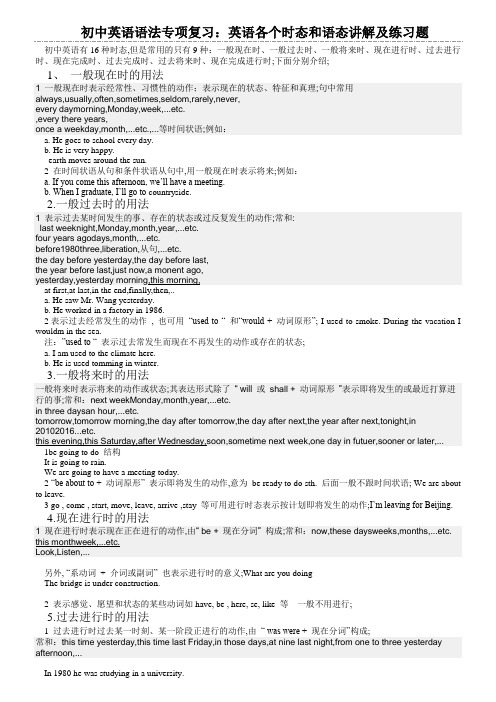
初中英语语法专项复习:英语各个时态和语态讲解及练习题初中英语有16种时态,但是常用的只有9种:一般现在时、一般过去时、一般将来时、现在进行时、过去进行时、现在完成时、过去完成时、过去将来时、现在完成进行时;下面分别介绍;1、一般现在时的用法1 一般现在时表示经常性、习惯性的动作;表示现在的状态、特征和真理;句中常用always,usually,often,sometimes,seldom,rarely,never,every daymorning,Monday,week,...etc.,every there years,once a weekday,month,...etc.,...等时间状语;例如:a. He goes to school every day.b. He is very happy.earth moves around the sun.2 在时间状语从句和条件状语从句中,用一般现在时表示将来;例如:a. If you come this afternoon, we’ll have a meeting.b. When I graduate, I’ll go to countryside.2.一般过去时的用法1 表示过去某时间发生的事、存在的状态或过反复发生的动作;常和:last weeknight,Monday,month,year,...etc.four years agodays,month,...etc.before1980three,liberation,从句,...etc.the day before yesterday,the day before last,the year before last,just now,a monent ago,yesterday,yesterday morning,this morning,at first,at last,in the end,finally,then,..a. He saw Mr. Wang yesterday.b. He worked in a factory in 1986.2表示过去经常发生的动作, 也可用“used to “ 和“would + 动词原形”; I used to smoke. During the vacation I wouldm in the sea.注:”used to “ 表示过去常发生而现在不再发生的动作或存在的状态;a. I am used to the climate here.b. He is used tomming in winter.3.一般将来时的用法一般将来时表示将来的动作或状态;其表达形式除了“ will 或shall + 动词原形”表示即将发生的或最近打算进行的事;常和:next weekMonday,month,year,...etc.in three daysan hour,...etc.tomorrow,tomorrow morning,the day after tomorrow,the day after next,the year after next,tonight,in 20102016...etc.this evening,this Saturday,after Wednesday,soon,sometime next week,one day in futuer,sooner or later,...1be going to do 结构It is going to rain.We are going to have a meeting today.2 “be about to + 动词原形” 表示即将发生的动作,意为be ready to do sth. 后面一般不跟时间状语; We are about to leave.3 go , come , start, move, leave, arrive ,stay 等可用进行时态表示按计划即将发生的动作;I’m leaving for Beijing.4.现在进行时的用法1 现在进行时表示现在正在进行的动作,由“ be + 现在分词” 构成;常和:now,these daysweeks,months,...etc. this monthweek,...etc.Look,Listen,...另外, “系动词+ 介词或副词” 也表示进行时的意义;What are you doingThe bridge is under construction.2 表示感觉、愿望和状态的某些动词如have, be , here, se, like 等一般不用进行;5.过去进行时的用法1 过去进行时过去某一时刻、某一阶段正进行的动作,由“ was were + 现在分词”构成;常和:this time yesterday,this time last Friday,in those days,at nine last night,from one to three yesterday afternoon,...In 1980 he was studying in a university.He was reading a novel when I came in.6.现在完成时的用法现在完成时由“have/has + 过去分词.其使用有两种情况:1 现在完成时所表示的动作在说话之前已完成,但对现在有影响;句中没有具体时间状语;常和:just,alreadly,yet,never,ever,now,before,this week,today,these days,once,twice,three times,...He has gone to Fuzhou.He has been to Fuzhou.2 现在完成时所表示的动作开始于过去,持续到现在,也许还会持续下去常用for 和since表示一段时间的状语或since then1949,last Monday,two o'clock,从句...,etc.,ever since then,for three daysa long time,two hours,...etc.so far , now, today, this wek month, year 等表示包括现在内的状语;He has studied English for 5 years.He has studied English since 1985.Now I have finished the work..注意:表示短暂时间动作的词如come, go , die, marry, buy 等的完成时不能与for, since 等表示一般时间的词连用;正确:I have bought the book already.错误:I have bought the book for two years.改:I have had the bookl for two years.7.过去完成时的用法1 过去完成时由“had + 过去分词”构成;过去完成时的动作表示过去某一时刻或某一时刻或某一动作之前完成的动作或状态;句中常用by then1977,yesterday,eight last night,the time we got there,...etc.by the end of last termweek,year,month,...etc..by, before, until, when 等词引导的时间状语;By the end of last year we had built five new houses.I had learnt 5000 words before I entered the university.2过去完成时的动词还可表示过去某一时刻之前发生的动作或状态持续到过去某个时间或持续下去;Before he slept, he had worked for 12 hours.8.过去将来时的用法过去将来时表示从过去的某个时间看来将要发生的动作或存在的状态;过去将来时由“should 或would + 动词原形” 构成;第一人称用should, 其他人称用would. ;常和:They were sure that they would succeed.二动词语态1.当句子的主语是动作的执行者时, 谓语的形式叫主动语态;句子的主语是动作承受者时,谓语的形式叫被动作语态;被动语态由助动词be + 过去分词构成,时态通过be 表现出来;1 一般现在时:You are required to do this.2 一般过去时:The story was told by her.3 一般将来时:The problem will be discussed tomorrow.4 现在进行时:The road is being widened.5 过去进行时:The new tool was being made.6 现在完成时:The novel has been read.7 过去完成时:He said that the work had been finished.8 过去将来时:He said that the trees would be planted soon.2. 一些特殊的被动结构1 带情态动词的被动结构:The problem must be solved soon.2 带不定式的被动结构:The room is going to be painted.The homework needs to be done with care.3 短语动词的被动:a.不及物动词+介词:若这类短语动词是及物性的,则可用于被动语态中,如:laugh at, look after, talk about, think of 等;若这类短语动词是不及物性的则不可用于被动语态中,如:book up, look down. 等b.及物动词+副词:bring about, carry out, find out, make out, put away, put off, take up, turn down, turn out, wipe out 等c. 动词+副词+介词:do away with, face up to, give into ,look down upon, make up with等d. 动词+名词+介词:catch sight of, keep on eye on, make a fool of , pay attention to , put an end to , set fire/light to , take notice of 等4 带复合宾语的动词在改为被动语态时,一般把主动结构中的宾语改为主语,宾语补足语保留在谓语后面;We always keep the classroom clean.比较:The classroom is always kept clean.5主动形式表示被动意义的词;常见的有:a.主动形式,这时动名词同句中的主语有动宾关系;The children need looking after.The windows wants /requires repairing.This point deserves mentioning.练习题1. It is a fine day. The sun __________shine brightly.2. They ___________visit the Science Museum next Sunday.3. Mr Brown________live in Beijing since he came to China.4. Mr Wang ________teach us English two years ago.5. The Smiths _______________ watch TV at this time last night.6. We __________learn about ten English songs by the end of last term.7. Father said that he ____________buy a new bike for me the next Friday.8. Bill isn¡¯t here. He ___________chat with his friends in the classroom.9. The teacher said that the moon __________go round the earth.10. The Young Pioneers will go to the zoo if it ____________not rain this Sunday.11. Listen They __________talk about the new film.12. Jim asked us what ___________happen in China in 1976.13. My mobile phone ___________steal on a bus last week.14. The host ____________interview the little boy just now.15. The Greens __________watch TV now.16. He said that he _____________ring me up when he got there.17. We ____________learn English for about three years.18. My brother_____________join the League in 1997.19. The farmers __________pick apples when I saw them.20. The red skirt __________cost the girl forty yuan.21. The film ____________begin when I got to the cinema.22. The girl told me that she wanted to be an English teacher when she _____grow up.23. My sister is a student and she _____________study at a middle school nearby.24. Mr Green __________travel to several places in South China since he came here.25. You _________catch the early bus if you get up early.26. _______you been________wear glasses all the time27. I’ll go home as soon as I _______finish my homework.29. Most science books are ______write in English.30. I ____________stay there for two months last year.31. Tell Lily to call me as soon as she _______.A. will arriveB. gets thereC. has goneD. reach here32. ----Hi, Kate. You look tired. What’s the matter ----I ______ well last night.A. didn’t sleepB. don’t sleepC. haven’t sleptD. won’t sleep33. ----Excuse me, look at the sign over there, please. Could you stop smoking----Sorry, I ____ that.A. didn’t seeB. don’t seeC. won’t seeD. can’t see34. ----Well, I found this. I think it must be yours. ----My watch Thank you. Where _____itA. do you findB. had you foundC. were you findingD. did you find35. ----Don you know when Dr White ____ for dinner this evening----No, but I think he ____ when he is free.A. will come; comesB. will come; will comeC. comes; comesD. comes; will come36. Look at those black clouds. It _____ rain. Let’s hurry. A. maybe B. would C. has D. is going to37. ----Jimmy is leaving for a holiday. ----Really Where ____ he ____A. has; goneB. will; goC. did; goD. does; go38. ----Shall we go shopping now ---Sorry, I can't. I ____ my shirts.A. washB. washesC. washedD. am washing39. ----I called you yesterday evening, but there was no answer.----Oh, I am sorry. I ___ dinner at my friend's home.A. haveB. hadC. was havingD. have had40. The Oriental Pearl TV Tower ____ thousands of visitors since 1995.A. attractedB. attractsC. has attractedD. will attract46. ----Why didn't you go to the cinema yesterday -----Because I ____ the film before.A. had seenB. have seenC. have watchedD. has watched47. I don't think John saw me. He ____ a book at that moment.A. just readB. has just readC. was just readingD. had just read48. Mr Smith ____ a book about China last year but I don't know whether he has finished it.A. has writtenB. wroteC. had writtenD. was writing49. Mr White ____ the newspaper while his daughter ____TV.A. has read; was watchingB. was reading; watchedC. was reading; was watchingD. reading; watched50. ---- I ____ you at the meeting. Why ----I was ill. A. saw B. have seen C. not see D. didn't see51. The 29th Olympic Games ____ in Beijing in 2008. A. hold B. will hold C. will be held D. held52. Hurry up The play ____ for ten minutes. A. has been on B. has begun C. had begun D. began53. ----May I speak to Mr Smith ----Sorry, he ____ Australia. But he ____ in two days.A. has been to; will come backB. has gone to; will be backC. has been in; would come backD. is leaving for; doesn't come back54. I can't go to the theater tonight because I ____ my ticket.A. have lostB. had lostC. will loseD. was losing55. ----What a nice bike How long ____ you ____ it ----Just two weeks.A. have; boughtB. did; buyC. have; hadD. are; having56. ----I'm sorry to have kept you waiting. ----Oh, not at all. I ____ here only for a few minutes.A. have comeB. had beenC. wasD. have been57. ----____ my dictionary anywhere ---- Yes. I saw it on your desk a moment ago.A. Did you seeB. If you seeC. Had you seenD. Would you see58. We were all surprised when he mad it clear that he ____ office soon.A. leavesB. would leaveC. will leaveD. had left答案:I. 1. shines/ is shining 2. are going to/ will visit 3. has lived 4. taught5. were watching6. had learned7. would buy8. is chatting9. goes 10.doesn't rain 11. are talking 12. happened 13. was stolen 14. interviewed15. are watching16. would ring 17. have learned 18. joined 19. were picking 20. cost21. had begun 22. grew 23. studies 24. has traveled 25. will catch26. Have; wearing 27. finish 28. haven't heard 29. written 30. stayedII. 31--35 BAADB 36--40 DBDCC 41--45 ACBAC 46--50 ACDCD51--55 CABAC 56--60 DABDA 61--65 BDBAB 66-70 BDABC 71--75 BCADD。
初中英语动词的时态常见题型及答题技巧及练习题含答案含解析
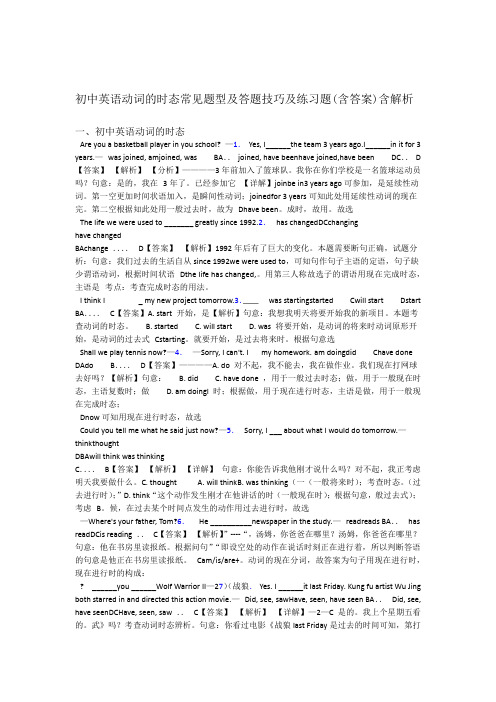
初中英语动词的时态常见题型及答题技巧及练习题(含答案)含解析一、初中英语动词的时态Are you a basketball player in you school? —1.Yes, I______the team 3 years ago.I______in it for 3 years.—was joined, amjoined, was BA..joined, have beenhave joined,have been DC..D 【答案】【解析】【分析】————3年前加入了篮球队。
我你在你们学校是一名篮球运动员吗?句意:是的,我在3年了。
已经参加它【详解】joinbe in3 years ago可参加,是延续性动词。
第一空更加时间状语加入,是瞬间性动词;joinedfor 3 years可知此处用延续性动词的现在完。
第二空根据知此处用一般过去时,故为Dhave been。
成时,故用。
故选The life we were used to _______ greatly since 1992.2.has changedDCchanginghave changedBAchange ....D【答案】【解析】1992年后有了巨大的变化。
本题需要断句正确,试题分析:句意:我们过去的生活自从since 1992we were used to,可知句作句子主语的定语,句子缺少谓语动词,根据时间状语Dthe life has changed,。
用第三人称故选子的谓语用现在完成时态,主语是考点:考查完成时态的用法。
I think I _ my new project tomorrow.3.was startingstarted Cwill start Dstart BA....C【答案】A. start 开始,是【解析】句意:我想我明天将要开始我的新项目。
本题考查动词的时态。
B. started C. will start D. was 将要开始,是动词的将来时动词原形开始,是动词的过去式Cstarting。
初中英语各种时态复习及练习题

初中英语时态复习及练习题一、一般现在时1. 定义:表示通常性、规律性、习惯性的状态或者动作(有时间规律发生的事件)的一种时间状态,或.表示主语具备的性格、能力和特征。
(1、现在的状态。
2、经常或习惯性动作。
3、主语所具备的性格和能力。
4、客观真理。
)2.标志:often(经常),usually(通常),sometimes(有时),always(总是),never(从不),on Sundays (在星期天), every day/month/year(每一天/月/年)3.结构:(1)主语+连系动词be(am/is/are)+名词/形容词/数词/介词短语/副词等做表语表状态(包括There be +n. There is a rabbit.)练习: 1.I______(be) a student. My name_____(be) Tom.2. Where _____(be) my shoes? They___(be) here.3.Who ____(be) the girl with long straight hair? I think she ___(be) Kate.4. You and I ___(not be) in Class Six.5.___(be) there a supermarket on the Fifth Avenue? Yes, there_____(be).6. ____ her parent tall? No, he____.(2)主语(非第三人称单数)+行为动词原形+其他(用助动词do 帮助构成否定句、一般疑问句和特殊疑问)(3)主语(第三人称单数)+行为动词的第三人称单数+其他(用助动词does 帮助构成否定句、一般疑问句和特殊疑问句)行为动词第三人称单数加-s的形式:1.直接加s2. 辅音+y结尾,变y为i加es: study-studies3.以s,x,ch,sh结尾加eswatch-watches teach-teaches 4.不规则变化have-has do-does go-goes1)His parents _______________(watch) TV every night. 肯定句1) My brother ______________(do) homework every day.2)His parents ______________(not watch) every night.否定句2)My brother_______________(not do)homework every day.3)__________his parents____________(watch) TV every night?一般疑问句3)__________ your brother _________ (do) homework every day?4. 例句:(1)My mother gives ten Yuan to my sister every week.我妈妈每星期给我妹妹十元钱。
英语动词的时态总复习经典例题、习题含答案解析百度文库
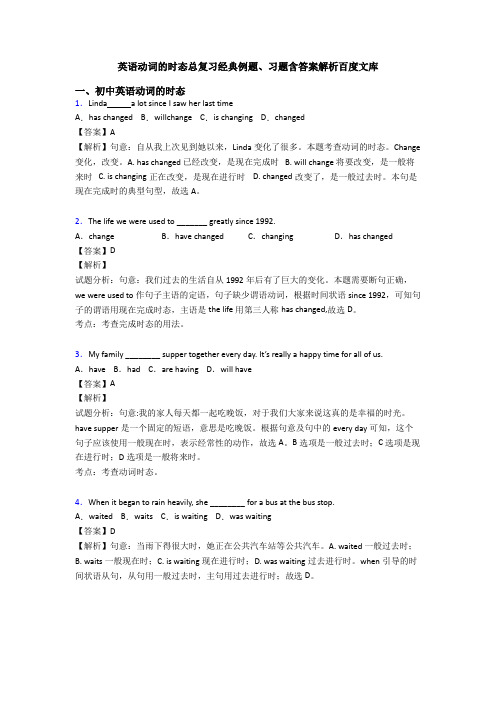
英语动词的时态总复习经典例题、习题含答案解析百度文库一、初中英语动词的时态1.Linda a lot since I saw her last timeA.has changed B.willchange C.is changing D.changed【答案】A【解析】句意:自从我上次见到她以来,Linda变化了很多。
本题考查动词的时态。
Change 变化,改变。
A. has changed 已经改变,是现在完成时 B. will change 将要改变,是一般将来时 C. is changing正在改变,是现在进行时 D. changed改变了,是一般过去时。
本句是现在完成时的典型句型,故选A。
2.The life we were used to _______ greatly since 1992.A.change B.have changed C.changing D.has changed【答案】D【解析】试题分析:句意:我们过去的生活自从1992年后有了巨大的变化。
本题需要断句正确,we were used to作句子主语的定语,句子缺少谓语动词,根据时间状语since 1992,可知句子的谓语用现在完成时态,主语是the life 用第三人称has changed,故选D。
考点:考查完成时态的用法。
3.My family ________ supper together every day. It’s really a happy time for all of us. A.have B.had C.are having D.will have【答案】A【解析】试题分析:句意:我的家人每天都一起吃晚饭,对于我们大家来说这真的是幸福的时光。
have supper是一个固定的短语,意思是吃晚饭。
根据句意及句中的every day可知,这个句子应该使用一般现在时,表示经常性的动作,故选A。
压轴题06 动词的时态-2023年中考英语压轴题专项训练(全国通用) 压轴题06 动词的时
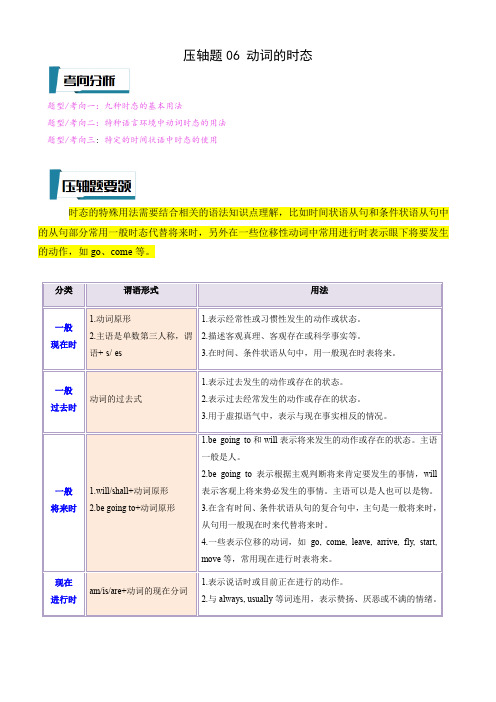
压轴题06 动词的时态题型/考向一:九种时态的基本用法题型/考向二:特种语言环境中动词时态的用法题型/考向三: 特定的时间状语中时态的使用时态的特殊用法需要结合相关的语法知识点理解,比如时间状语从句和条件状语从句中的从句部分常用一般时态代替将来时,另外在一些位移性动词中常用进行时表示眼下将要发生的动作,如go、come等。
【特例清单】现在完成时中表示短暂动作的动词不能与for, since等引导的时间状语连用。
如与一段时间连用,要把瞬间动词转化为意思相近的延续性动词。
常见的变化有:1.(2023·江苏无锡·无锡市天一实验学校校考一模)— Has your father come back from Shanghai?— Yes. He ________ there for about one month to help people there fight against the virus.A.has stayed B.stays C.stayed D.will stay2.(2023·上海·九年级专题练习)Paper decorations ________ from the ceiling in every classroom last week. A.were hanged B.were hung C.had been hanged D.had been hung3.(2023·山东·统考一模)—I called you last night at 9:30 and I believed you ________ be at home because no one answered the phone.—Sorry, I ________ at that time.A.mustn’t; would have been sleeping B.couldn’t; should have sleptC.couldn’t; must have been sleeping D.might not; need have been slept4.(2023·上海虹口·统考一模)Unless you avoid charging your cellphone all the time, the battery inside it________ easily.A.damages B.is damaged C.will damage D.will be damaged5.(2023·江苏扬州·校考一模)The career he devoted himself to ________ him ________ by people all over the world.A.made; remembered B.making; rememberC.making; was remembered D.made; to remember6.(2023·江苏扬州·校考一模)—A lot of money ________ for the old man’s operation online.—Yes, but the medicine cost ________ a lot, so we still need to get more for him.A.raised; rose B.was raised; has risenC.was risen; has raised D.was raised; rose7.(2022·辽宁葫芦岛·统考二模)There ________ many ordinary(平凡)Chinese making great contributions to our motherland last year.A.has B.had C.were D.was8.(2023·江苏徐州·统考一模)The three-person team of Shenzhou-14 returned home in December, 2022. Do you know ________?A.if they will carry out many tasks B.how many classes did Liu Yang giveC.where it would land on earth at last D.when it was sent to Tiangong Space Station9.(2022秋·贵州铜仁·九年级统考期末)—Would you like to go to the city park?—I’m not sure. If Mark goes, ________.A.so I do B.so do I C.so I will D.so will I10.(2022秋·河北石家庄·九年级石家庄市第四十二中学校考期末)How amazing it is! China ________ forty-three BeiDou Satellites successfully.A.sends B.sent C.has sent D.will sent11.(2022·四川雅安·校考一模)—Could you tell me ________ yesterday?—Because my bike was broken on my way here.A.why you came late B.why do you come lateC.how you come late D.how did you come late12.(2022·四川达州·统考一模)He ________ go unless you ________ him.A.won’t; invite B.doesn’t; invite C.doesn’t; will invite D.won’t; will invite 13.(2022·吉林长春·校考模拟预测)The movie had already begun, but Lisa didn’t ________. What happened to her?A.give up B.take up C.stay up D.show up14.(2022·贵州铜仁·统考三模)— I want to know if there ________ a sports meeting next month.— If it ________, what kind of sport will you take part in?A.will be, comes B.will be, will come C.is, comes D.is, will come15.(2022·广东江门·校考一模)—Mike, how long have you ________ the dictionary?—For two years.A.had B.buy C.bought D.borrowed16.(2022·甘肃天水·校联考模拟预测)— How long have you _________ this car?— I ________ it last year.A.bought; bought B.bought ; buy C.had;bought D.bought; had17.(2022·甘肃武威·校考一模)—You look sad. What’s the matter?—I had a bad morning. By the time I got to school, I found I ________ my homework at home. I had to go back home to get it.A.have forgotten B.had forgotten C.have left D.had left18.(2022·江西南昌·校考一模)—We ________ to the water park. Would you like to join us?—Sorry. I prefer to stay at home and watch TV.A.set out B.have set out C.are setting out D.had set out19.(2023·云南昆明·模拟预测)— Can you hand in your writing tomorrow?— I can make it if I ________ one more day.A.am given B.give C.will give D.will be given20.(2022·甘肃天水·校联考模拟预测)We wonder if our teacher ________ to our graduating party. If she________ next weekend, we’ll be pleased.A.will come; will come B.comes; will come C.will come; comes D.comes; comes21.(2023·安徽滁州·校联考一模)—Look! How clean the classroom is!—Yes. I’m sure someone _______ it up.A.cleans B.is cleaning C.will clean D.has cleaned22.(2023春·全国·九年级期末)— Why did so many people get hurt in the earthquake?— Don’t you know? People when it happened that night.A.slept B.have slept C.sleep D.were sleeping23.(2023·湖北·统考一模)—Where is Catherine? I haven't seen her for days.—She Wuhan.She’ll be back next week.A.has gone to B.has been to C.have gone to D.have been to24.(2023·全国·九年级专题练习)—Where are the teachers now?—In the meeting room. They _________ the meeting for 10 minutes.A.have begun B.have been on C.have had D.have been held 25.(2023·安徽合肥·统考一模)—Have you ever been to Hefei?—Certainly. Actually, I ________ there for four years but now I moved to Anqing.A.work B.have worked C.was working D.worked26.(2023·江苏南京·模拟预测)Tom and I belong to a team. If he doesn’t agree on the plan, ________. A.neither do I B.neither I will C.nor do I D.neither will I27.(2023·安徽合肥·统考一模)— Where have you been these days?—I’ve just come back from Canada. I ________ there for three weeks.A.have stayed B.stayed C.stay D.will stay28.(2023·江苏南京·模拟预测)—Will you please tell Robin to come early to help us get ready for the party?—All right. I’ll tell him at once ________.A.if I see him B.if I’ll see him C.until1see him D.until I’ll see him 29.(2023·浙江温州·模拟预测)My parents ________ Tianjing on business for a whole week. So I live with my uncle these days.A.have been to B.have gone to C.have been in D.have been away 30.(2023·湖北·九年级专题练习)—Mum, I want to watch the news about our school. Change the channel, please!—What a pity! It is eight o'clock now. It___________ for a while.A.has been over B.was over C.has finished D.finished。
最新英语动词的时态答题技巧及练习题(含答案)

最新英语动词的时态答题技巧及练习题(含答案)一、初中英语动词的时态1.— The boy misses his parents very much.— So he does. They _________ the hometown for nearly two years.A.have left B.has left C.have been away from D.will leave【答案】C【解析】【详解】句意:——那个男孩非常想念他的父母。
——他的确是。
他们离开家乡几乎两年了。
leave 离开,是短暂性动词,不与时间段连用;be away离开,与时间段连用。
此处接时间段for nearly two years连用,故用延续性动词,故选C。
2.The life we were used to _______ greatly since 1992.A.change B.have changed C.changing D.has changed【答案】D【解析】试题分析:句意:我们过去的生活自从1992年后有了巨大的变化。
本题需要断句正确,we were used to作句子主语的定语,句子缺少谓语动词,根据时间状语since 1992,可知句子的谓语用现在完成时态,主语是the life 用第三人称has changed,故选D。
考点:考查完成时态的用法。
3.I think I _ my new project tomorrow.A.start B.started C.will start D.was starting【答案】C【解析】句意:我想我明天将要开始我的新项目。
本题考查动词的时态。
A. start 开始,是动词原形 B. started 开始,是动词的过去式 C. will start 将要开始,是动词的将来时 D. was starting就要开始,是过去将来时。
根据句意选C。
4.—My grandma looking at that photo on the wall.—I can understand. It helps her remember her childhood.A.enjoys B.enjoyedC.was enjoying D.will enjoy【答案】A【解析】句意:——我奶奶喜欢看墙上的那个照片。
(英语)英语动词的时态常见题型及答题技巧及练习题(含答案)及解析
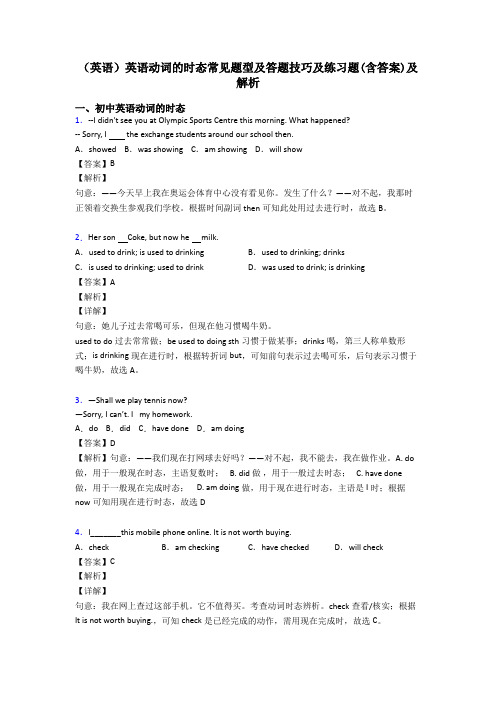
(英语)英语动词的时态常见题型及答题技巧及练习题(含答案)及解析一、初中英语动词的时态1.--I didn't see you at Olympic Sports Centre this morning. What happened?-- Sorry, I the exchange students around our school then.A.showed B.was showing C.am showing D.will show【答案】B【解析】句意:——今天早上我在奥运会体育中心没有看见你。
发生了什么?——对不起,我那时正领着交换生参观我们学校。
根据时间副词then可知此处用过去进行时,故选B。
2.Her son Coke, but now he milk.A.used to drink; is used to drinking B.used to drinking; drinksC.is used to drinking; used to drink D.was used to drink; is drinking【答案】A【解析】【详解】句意:她儿子过去常喝可乐,但现在他习惯喝牛奶。
used to do过去常常做;be used to doing sth习惯于做某事;drinks喝,第三人称单数形式;is drinking现在进行时,根据转折词but,可知前句表示过去喝可乐,后句表示习惯于喝牛奶,故选A。
3.—Shall we play tennis now?—Sorry, I can’t. I my homework.A.do B.did C.have done D.am doing【答案】D【解析】句意:——我们现在打网球去好吗?——对不起,我不能去,我在做作业。
A. do 做,用于一般现在时态,主语复数时; B. did做,用于一般过去时态; C. have done 做,用于一般现在完成时态; D. am doing做,用于现在进行时态,主语是I时;根据now可知用现在进行时态,故选D4.I_______this mobile phone online. It is not worth buying.A.check B.am checking C.have checked D.will check【答案】C【解析】【详解】句意:我在网上查过这部手机。
【英语】初中英语动词的时态解题技巧及练习题(含答案)及解析
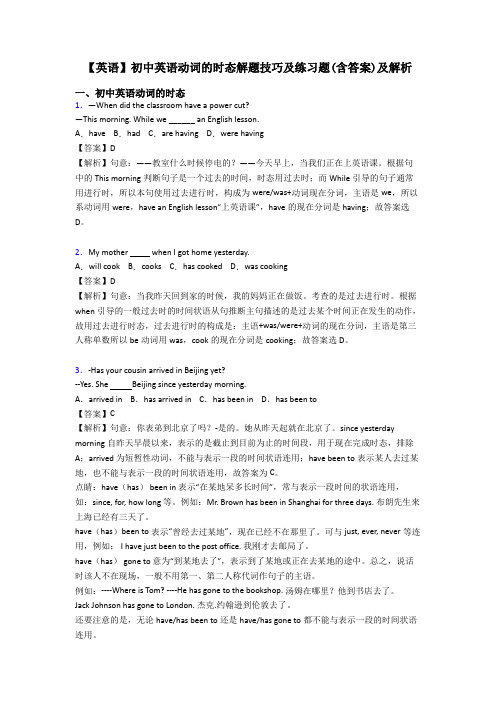
【英语】初中英语动词的时态解题技巧及练习题(含答案)及解析一、初中英语动词的时态1.—When did the classroom have a power cut?—This morning. While we ______ an English lesson.A.have B.had C.are having D.were having【答案】D【解析】句意:——教室什么时候停电的?——今天早上,当我们正在上英语课。
根据句中的This morning判断句子是一个过去的时间,时态用过去时;而While引导的句子通常用进行时,所以本句使用过去进行时,构成为were/was+动词现在分词,主语是we,所以系动词用were,have an English lesson“上英语课”,have的现在分词是having;故答案选D。
2.My mother when I got home yesterday.A.will cook B.cooks C.has cooked D.was cooking【答案】D【解析】句意:当我昨天回到家的时候,我的妈妈正在做饭。
考查的是过去进行时。
根据when引导的一般过去时的时间状语从句推断主句描述的是过去某个时间正在发生的动作,故用过去进行时态,过去进行时的构成是:主语+was/were+动词的现在分词,主语是第三人称单数所以be动词用was,cook的现在分词是cooking;故答案选D。
3.-Has your cousin arrived in Beijing yet?--Yes. She Beijing since yesterday morning.A.arrived in B.has arrived in C.has been in D.has been to【答案】C【解析】句意:你表弟到北京了吗?-是的。
她从昨天起就在北京了。
since yesterday morning自昨天早晨以来,表示的是截止到目前为止的时间段,用于现在完成时态,排除A;arrived为短暂性动词,不能与表示一段的时间状语连用;have been to表示某人去过某地,也不能与表示一段的时间状语连用,故答案为C。
高中英语必修课----复习动词时态知识讲解及巩固练习题(含答案解析)
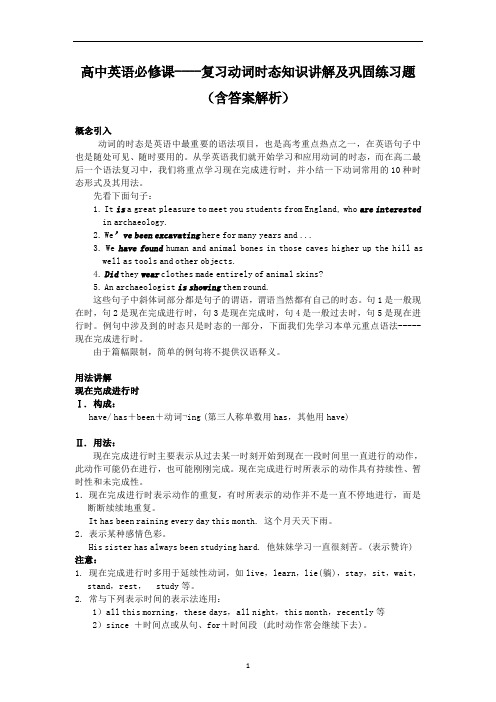
高中英语必修课----复习动词时态知识讲解及巩固练习题(含答案解析)概念引入动词的时态是英语中最重要的语法项目,也是高考重点热点之一,在英语句子中也是随处可见、随时要用的。
从学英语我们就开始学习和应用动词的时态,而在高二最后一个语法复习中,我们将重点学习现在完成进行时,并小结一下动词常用的10种时态形式及其用法。
先看下面句子:1.It is a great pleasure to meet you students from England,who are interestedin archaeology.2.We’ve been excavating here for many years and...3.We have found human and animal bones in those caves higher up the hill aswell as tools and other objects.4.Did they wear clothes made entirely of animal skins?5.An archaeologist is showing them round.这些句子中斜体词部分都是句子的谓语,谓语当然都有自己的时态。
句1是一般现在时,句2是现在完成进行时,句3是现在完成时,句4是一般过去时,句5是现在进行时。
例句中涉及到的时态只是时态的一部分,下面我们先学习本单元重点语法-----现在完成进行时。
由于篇幅限制,简单的例句将不提供汉语释义。
用法讲解现在完成进行时Ⅰ.构成:have/has+been+动词¬ing(第三人称单数用has,其他用have)Ⅱ.用法:现在完成进行时主要表示从过去某一时刻开始到现在一段时间里一直进行的动作,此动作可能仍在进行,也可能刚刚完成。
现在完成进行时所表示的动作具有持续性、暂时性和未完成性。
1.现在完成进行时表示动作的重复,有时所表示的动作并不是一直不停地进行,而是断断续续地重复。
人教版英语英语动词的时态解题技巧(超强)及练习题(含答案)含答案解析百度文库

人教版英语英语动词的时态解题技巧(超强)及练习题(含答案)含答案解析百度文库一、初中英语动词的时态1.I _______ a picnic with my brother last Sunday. It was great.A.have B.hadC.will have D.am having【答案】B【解析】句意:上周日我和我的哥哥一起去野餐了,非常棒。
have有,动词原形;had是have的过去式;will have将会有,一般将来时态;am having现在进行时态。
have a picnic去野餐,是一个固定短语。
根据句中的时间状语last Sunday可知,这里说的是过去的事情,应用一般过去时态,故选B。
2.—Shall we play tennis now?—Sorry, I can’t. I my homework.A.do B.did C.have done D.am doing【答案】D【解析】句意:——我们现在打网球去好吗?——对不起,我不能去,我在做作业。
A. do 做,用于一般现在时态,主语复数时; B. did做,用于一般过去时态; C. have done 做,用于一般现在完成时态; D. am doing做,用于现在进行时态,主语是I时;根据now可知用现在进行时态,故选D3.—What do you often do at weekends?—I often ________ my grandparents.A.visit B.visited C.have visited D.will visit【答案】A【解析】【详解】句意:你经常在周末做什么?——我经常去看我的爷爷奶奶。
考查句子时态。
A. visit 一般现在时;B. visited 一般过去时;C. have visited现在完成时;D. will visit一般将来时。
结合语境可知下文often可知是经常性动作,故用一般现在时态。
英语动词的时态复习含答案解析百度文库
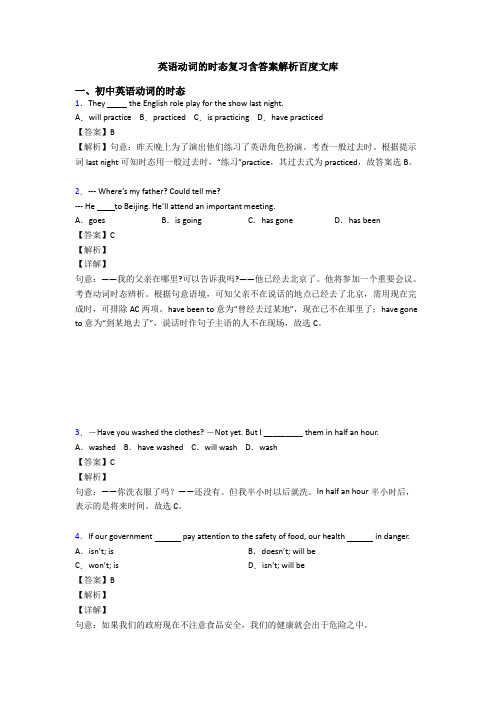
英语动词的时态复习含答案解析百度文库一、初中英语动词的时态1.They the English role play for the show last night.A.will practice B.practiced C.is practicing D.have practiced【答案】B【解析】句意:昨天晚上为了演出他们练习了英语角色扮演。
考查一般过去时。
根据提示词last night可知时态用一般过去时,“练习”practice,其过去式为practiced,故答案选B。
2.--- Where’s my father? Could tell me?--- He to Beijing. He’ll attend an important meeting.A.goes B.is going C.has gone D.has been【答案】C【解析】【详解】句意:——我的父亲在哪里?可以告诉我吗?——他已经去北京了。
他将参加一个重要会议。
考查动词时态辨析。
根据句意语境,可知父亲不在说话的地点已经去了北京,需用现在完成时,可排除AC两项。
have been to意为“曾经去过某地”,现在已不在那里了;have gone to意为“到某地去了”,说话时作句子主语的人不在现场,故选C。
3.-Have you washed the clothes? -Not yet. But I _________ them in half an hour. A.washed B.have washed C.will wash D.wash【答案】C【解析】句意:——你洗衣服了吗?——还没有。
但我半小时以后就洗。
In half an hour半小时后,表示的是将来时间。
故选C。
4.If our government pay attention to the safety of food, our health in danger. A.isn’t; is B.doesn’t; will beC.won’t; is D.isn’t; will be【答案】B【解析】【详解】句意:如果我们的政府现在不注意食品安全,我们的健康就会出于危险之中。
小学英语时态复习现在进行时专项讲解和训练
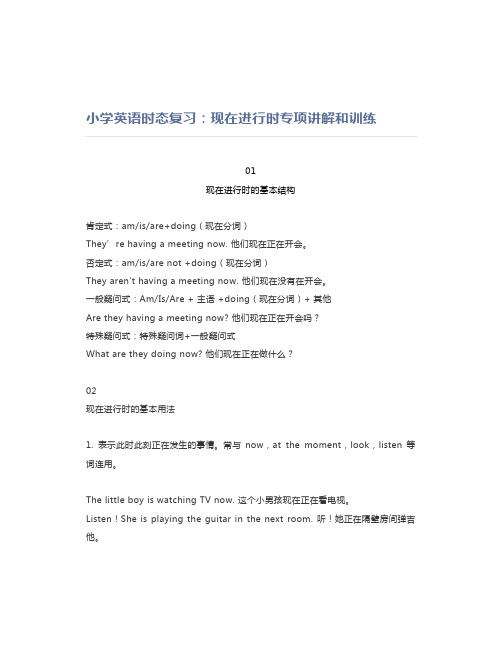
小学英语时态复习:现在进行时专项讲解和训练01现在进行时的基本结构肯定式:am/is/are+doing(现在分词)They’re having a meeting now. 他们现在正在开会。
否定式:am/is/are not +doing(现在分词)They aren't having a meeting now. 他们现在没有在开会。
一般疑问式:Am/Is/Are + 主语 +doing(现在分词)+ 其他Are they having a meeting now? 他们现在正在开会吗?特殊疑问式:特殊疑问词+一般疑问式What are they doing now? 他们现在正在做什么?02现在进行时的基本用法1. 表示此时此刻正在发生的事情。
常与now,at the moment,look,listen等词连用。
The little boy is watching TV now. 这个小男孩现在正在看电视。
Listen!She is playing the guitar in the next room. 听!她正在隔壁房间弹吉他。
2. 表示现阶段一直在进行着或是重复发生着的动作,不强调此时此刻正在做。
常与表示时间段的时间状语连用。
I am studying computer this term. 这个学期我一直在学习计算机。
3. 表示说话人褒义或贬义的情感色彩,如赞许、批评、喜欢、厌恶等。
此时常与alway、often等频度副词连用。
He is always thinking of others , not of himself. 他总是为他人着想,而不为自己。
(表示赞许)One of my roommates is often leaving things about. 我的一个室友经常乱扔东西。
(表示不满)4. 表示在近期按计划或安排要发生的动作。
(现在进行时表示一般将来的含义。
英语动词的时态复习含答案解析百度文库

英语动词的时态复习含答案解析百度文库一、初中英语动词的时态1.They the English role play for the show last night.A.will practice B.practiced C.is practicing D.have practiced【答案】B【解析】句意:昨天晚上为了演出他们练习了英语角色扮演。
考查一般过去时。
根据提示词last night可知时态用一般过去时,“练习”practice,其过去式为practiced,故答案选B。
2.She ________on the phone,so I just smiled at her and went away.A.has talked B.was talking C.will talk D.is talking【答案】B【解析】【详解】句意:她正在打电话,所以我只是朝她笑笑就走了。
考查动词时态辨析。
so所以,表结果;根据so I just smiled at her and went away,可知她正在打电话,需用过去进行时,故选B。
3.They their holidays in Paris last summerA.spend B.spentC.will spend D.are spending【答案】B【解析】句意:去年,他们在巴黎度假了。
本题考查动词的时态A. spend 花费,度过,是动词原形 B. spent 度过,是动词的过去式 C. will spend 将要度过,是将来时态 D. are spending。
正在度过,是现在进行时。
根据题意,去年度过的。
故选B。
4.Peter and Linda Beijing for Shanghai yesterday afternoon.A.leave B.left C.are leaving D.will leave【答案】B【解析】【详解】句意:昨天下午Peter和 Linda离开北京去上海了。
- 1、下载文档前请自行甄别文档内容的完整性,平台不提供额外的编辑、内容补充、找答案等附加服务。
- 2、"仅部分预览"的文档,不可在线预览部分如存在完整性等问题,可反馈申请退款(可完整预览的文档不适用该条件!)。
- 3、如文档侵犯您的权益,请联系客服反馈,我们会尽快为您处理(人工客服工作时间:9:00-18:30)。
初中英语动词时态专项练习题用括号中动词的适当的形式填空。
1. The boy is happy because he ___________(sell) out all the newspapers.2.The plan _____________(give) up because of rain.3.If it __________(not rain) tomorrow, we ____________(go )fishing.Where ____________you____________(be) these days?5.Where is Tom? He _________(go) to the post office. He said he _________(come) back soon.6.Mike says he _________(want )to be a worker after he _________ (finish )school.7.The last bus ____________just ________(leave) when they ________(get) to the bus stop. 8.She _________(not go) to bed until she _______(finish) her work.9.Light ___________(travel )much faster than sound.10.I __________(feel) much better after I _______(take) the medicine.11.”Where ________we________(meet)?”“Let’s meet outside the park gate.”12.I_________(be) afraid Mr Johnson __________(not visit) out school tomorrow.13.I _________(lost) my bike ._________you _________(see) it anywhere?14.________this kind of car __________(produce) in Shanghai?15.We __________(see) several members of the family since we ________(arrive)16.I found that the students _________(play) football on the playground.17.The shop ___________(close) at this time of day.18.Where ________your watch _________(lose)?19.________the doctor __________(send) for last night?20.Three children ___________(take) good care by the nurse.21.Some children ___________(take ) good care by the nurse.22.Some new houses _________(build) by the villagers themselves.23.What language ________(speak) in Australia?24.The colour TV _________(buy) in that shop three days ago.25.He said he __________(stay) here for another two days.26.The doctor said Jim must ________(operate ) on at once.27.“__________the bridge _______(repair) yet?”“Yes, the workers_______ already______(repair) it.”28.We are in Grade One this year, so we _________(teach ) physics next year.29.“Where _________(be) you last night?”“I_________(ask) to help Tom at home”The big tree ________(blow)down in the storm last night.31.I________ never ________(eat) such delicious noodles before.32.When we reached the town, it _______(get) dark.33.We ________(have) lunch when suddenly someone knocked at the door.34.Lucy said she ________(visit) the school the next month.35.I ________(wait) until he comes back. 36.You ________(watch) TV after supper, aren’t you?37.They _________(be) to that small village several times.Can you tell me if it _________(snow) tomorrow?40.Could you tell me if you _________(read) the story book?41.He said the lights in the room _________(go) out when he opened the door.42.I _________(be) fifteen soon.43.Tom, your aunt _______(come) this afternoon .44.My teacher often _________(tell) us not to play on the street.45.They________(plant) trees on the hill. Do you see?46.The teacher said that the earth ________(move) round the sun.47.She said she _______(put) on a new coat the next day.48.The Great Wall _________(know) all over the world.49.Could you tell me where Alice ________ (live)?50.________the film ______(show) many times since last Sunday.51.________the street lights usually _______(turn) on at seven in summer evening?52.I _______(not go) to the cinema because I ________(see) the film before.53.It ________(get) dark. What about ________(go) home at once?54.You ________(be) late if you __________(not hurry).55.Use your head and you _________(find) a better way. 56.Look!Someone ________(lie) on the floor.57.It __________(rain) harder now. It ________(rain) quite often in summer.58.Here _______(come) the bus.59.I don’t know when the manager ________(return), but when be _________(come) back I _________(let) you know.60.“Where ________(be) you this time yesterday?”“I________(be) at home. I _______(go) over my lessons then.”KEY:1.has sold2.will be given up/ has been given up3.Doesn’t rain, will go4.have, been5.has gone, would come6.wants, finishes7.had, left, got8.won’t go, finishes9.travels10.felt, had taken11.shall/will, meet12.am, won’t visit13.have lost, Have seen14.is, produced15.Have seen, arrived16.were playing17.is closed18.was, lost/ has, bee lost 19.was, been sent20.was inverted21.are taken22.have been built23.is spoken24.was bought25.would stay26.be operated27.has, been repaired, have repaired 28.will be taught29.were ,was,30.was blew31.have, eaten32.got/ had got33.were having34.would visit35.will wait36.are watching37.have been38.snows39.had studied40.have read41.had been gone42.will be/ am43.will come44.tells45.are planting46.moves47.would putis known49.lives50.has, been showed 51.are, turned52.won’t go, have seen 53.gets, going54.will be, don’t hurrywill find56.is lying57.is raining/ rains, rains 58.comes59.will return, comes, will let 60.were, was, was going1.I will tell him as soon as he _____ backeB. comesC. will comeD. came2.Mary _____ on shoes when she ____ them.A.tries…buysB. tries…buysC. trys…buysD. trys…buys3.The girl often ______ cold when she ______.A.Catches…dancesB. catches…dancesC. Catches…dancesD. catches…dances4._____ he ____ himself there? No, I don't think so.A.Do…enjoyB. Does…enjoysC. Does…enjoysD. Does…enjoy5._____ your teacher ____ from them very often? Certainly.A.Do…hearB. Does…hearC. Do…receiveD. receive6.6. _____ your mother _____ some cleaning on Sundays?A.Does…doesB. Do…doesC. Does…doD. Do…do7._____ Tom _____to work hard to help his family ? Yes, he _____.A.Has…x…doesB. Has…x…doesC. Does…has…hasD. Does…have…does8. Which teacher _____ lessons to you every day ?A. does …givesB. does…giveC. do…giveD. gives9.Smith does not go fishing on weekdays, ____? _____ , he does.A.does he…NoB. does he…YesC. doesn't he…NoD. doesn't he…Yes10.Mr Black often _____ fishing on Sundays, _____ he ?A.goes…doesn'tB. goes…isn'tC. doesn't go…doesD. doesn't go…is11.He usually _____ TV on Sunday evening.A.watchB. watchesC. watchingD. is watching12.We'll go to play with snow if it ______ tomorrow.A.snowB. snowsC. will snowD. snowed13.Neither I nor he ______ French.A.speakB. doesn't speakC. SpeaksD. doesn't speak14.Nobody ______ how to run this machines.A . Know B. have knownC. knowsD. is knowing15.The Young Pioneer _____ water for the old man every day.A.CarryB. bringC. takesD. carries16.Some are ______ in the river and some are ______ games.A.swimming…playingB. swimming…PlayingC. swimming…I playingD. swimming…playing17.Look ! The boy students are _____ football while the girls are _____ .A.playing…danceB. playing…dancingC. play…dancingD. play…dance18.He _____ to do his lessons at eight every evening.A.is beginningB. is beginningC. BeginD. Begins19._____ he _____ on well with his friends this term ?A.Does…getsB. Does…getC. Is…gettingD. Is…getting20.Mr Smith _____ short stories, but he ____ a TV play these days.A.is writing…is writingB. is writing…writesC. writes…is writingD. writes…writes21.I _____ to the cinema. I ______ there every Sunday.A.go…goB. am going…goC. go…am goingD. am going…am going22.Look, they______ a good time, ____ they ?A.have…doB. have…don'tC. are having…areD. are having…aren't23.You ______ about the future now, ______ you ?A.don't think…don'tB. aren't thinking…aren'tC. don't think…doD. aren't thinking…are24.She always ______ something whenever she ______.A .studied…played B. studied…plaiedC.. studied…plaiedD. studied…played25.He often _____ late in the forest. It _____ me very much.,A.stayed…worriedB. staied…worriedC. stayed…worryedD. staied…worried26.I ______that the boy _____ with no tears in his eyes.A.noticed…cryedB. noticed…criedC. noticed…criedD. noticed…cryed27.We _____the floor and _____ all the windows.A.mopped…cleannedB. moped…cleanedC. mopped…cleanedD. moped…cleaned28.When I _____ the Children's Palace, the children _____ with joy.A.visited…jumppedB. visited…jumpedC. visited…jumpedD. visited…jumpped29.______ a sports meet last Sunday ? Yes , they ______.A.Did they have…DidB. Did they have…hadC. Had they...Had D. Had they (i)30.____ you _____out for a walk after supper ? Yes, I ______.A.Did…went…wentB. Did…go…wentC. Did...went...Did D. Did...go (i)31._____ Jack _____ on with his work or ______ to have a rest?A.Did…went…stoppedB. Did…go…stopC. Did…went…stopD. Did…go…stopped32.You gave them a talk two days ago, _____you ? Yes, I ______.A.did…DidB. did…gaveC. didn't…didD. didn't…gave33.____ your brother _____ a letter to ? My father.A.Who…wroteB. What…wroteC. Who did…writeD. What did…write34.They _____ about the TV news then in the sitting-room. They often ____ such talksA.talked…hadB. talk…haveC. were talking…hadD. are talking…have35.He ______ some cooking at that time, so _____ me.A.did…heardB. did…didn't hearC. was doing…heardD. was doing…didn't hear36." _____ you angry then?" "They_ too much noise.”A.Are…were makingB. Were…were makingC. Are…madeD. Were…made37.This time yesterday Jack _____ his, bike. He _____ TV.A.repaired…didn't watchB. was repairing…watchedC. repaired…watchedD. was repairing…wasn't watching38.We _____ for Tom at ten last Sunday. He often kept us ______.A.were waiting…waitingB. were waiting…waitC. waited…waitingD. waited…wait39.When you _____ at the door, I _____ some washing.A.knocked...did B. was knocking (i)C. knocked…was doingD. knock…am doing40.The boy_____ English on the radio when I _____ his door.A.learned…was openingB. was learning…openedC. learned…OpenedD. is learning…open41.When they______ through the forest, a bear _____ at them.A.walked…was comingB. were walking…CameC. were talking…comesD. walk…is coming42.A young man _____ her while she _____ her work.A.watched…was finishingB. was watching…finishedC. watched…finishedD. was watching…was finishing43.While mother _____ some washing, I ______ a kite for Kack.A.did…madeB. was doing…madeC. was doing…was makingD. did…was making44.I _____ myself French from 7 to 9 yesterday morning. I _____ to work.A.was teaching…didn't goB. taught…didn't goC. was teaching…wentD. taught…went45.He _____ a model plane when I came to see him.A.MakesB. is makingC. was makingD. made46.I ______ a letter at nine last night.A.is writingB. was writingC. wroteD. is writing47.The teacher_____ (give) us a history lesson when Tom walked into the classroom.A.GaveB. is givingC. was givenD. was giving48.There will be a football match in two days, that is _______.st SundayB. next SundayC. every SundayD. this Sunday49.We ______ class meeting this November.A.HadB. haveC. will haveD. are having50.He ______ in his garden every morning next year.A.will workB. worksC. workedD. is working51.Be careful. The train ______.A.will comeB. Had cameC. comesD. is coming52.Look at those clouds. It _____ soon, I'm afraid.A.is going to rainB. is rainingC. will rainD. won't rain53.The radio says it ______ the day after tomorrow.A.is going to snowB. is snowingC. will snowD. snows54._____ he _____ some shopping tomorrow afternoon ?A.Will…doesB. is going to doC. is…doingD. Shall…do55.What day _____ it ______ tomorrow ? Wednesday.A.is…going to beB. will…beC. shall…beD. does…be56.The boy _______ sixteen years old next year.A.is going to beB. is growing to beC. will beD. is57. _____ you ____ me up at six, please ?A.Are…going to wakeB. Are…wakingC. Will…wakeD. Do…wake58.If he ______ to college, he _____ a lot more.A.will go…will learnB. will go…is going to learnC. is going…is going to learnD. goes…will learn59.When she _____ next time ,l ______ her everything.A.is going to come…shall tellB. will come…shall tellC. comes…will tellD. come…will tellWhat day ____ it ____ tomorrow ? It ____Tuesday.A.is…going to be…isB. will…be…willC. is…going to be…is goingD. will be…will be参考答案:1—5 BABDB 6—10 CDDBA 11—15 BBCCD 16—20 CBDCC 21-25 BDDDA 26—30 BCBAD 31—35 BCCCD 36—40 BDACB 41-45 BDCAC 46—50 BDDCA 51—55 DACBB 56—60 CCDCD。
